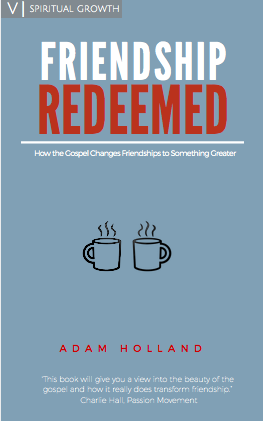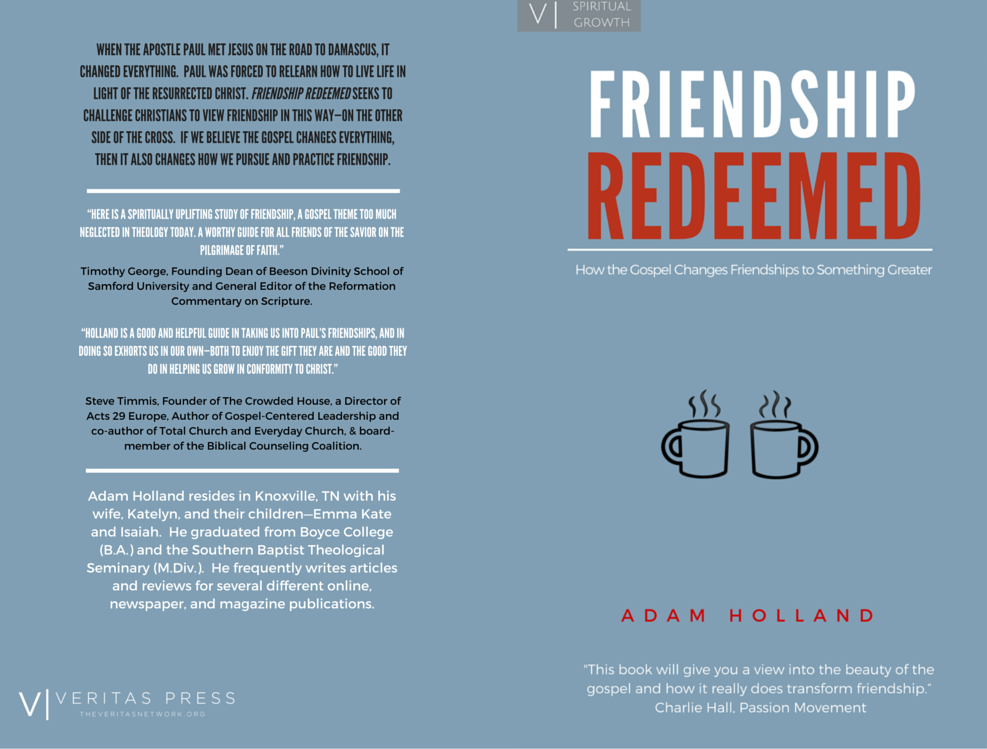The Redemption of Friendship


I’m always happy to read a book on friendship (just this year, I was immensely helped by Wesley Hill’s wonderful new book on the subject). However, it’s especially fun to read a book on friendship written by a really good friend (it’s like reading a book on blood draining by your favorite butcher!). In Friendship Redeemed, my comrade Adam Holland has written a fine work on a subject that desperately needs more thoughtful reflection. I think anyone who picks up the book will take away a number of very helpful insights. Particularly, the book will give you (1) a lens through which to view friendship, (2) examples of what redeemed friendship looks like, and (3) practical tips for living out redeemed friendship.
To begin with, Holland offers a lens through which to view friendship:
“Fixing our relationships with one another is not going to be resolved by a 10-step program or adding just a couple things. Living in this new humanity calls for a person to put on a new pair of glasses, through which he will look and see the world.”
The first chapter is simply an examination of friendship through the lens of the biblical story: creation, fall, redemption. We were created to have friends:
“Mankind was created in the image of the triune God. We were created to live in harmony or perfect unity with one another.”
Holland doesn’t just start in the beginning, he starts before the beginning, grounding our friendship in the triune nature of God. Of course, he quickly shows how that communal nature of man is broken:
“Man learns how to interact with one another through how they interact and relate to God. Once man sins by refusing to listen and obey the word of God, it then impacts man’s relationship with one another.” He then goes onto say, “When our vertical relationship with the Lord is not right, it has ramifications into our horizontal relationships with one another.”
As you might guess by the title, the rest of the book shows how friendship is being redeemed under Christ’s reign. Perhaps the whole book is best captured in the following sentence, “Christ’s death makes reconciliation possible not only with God, but also with one another.” For Holland, the biblical story isn’t simply head knowledge, something to be tucked away for Bible-trivia night. No, the gospel changes things, it redeems. At the end of the book, you’ll see how the biblical story invites you to participate, to pick up the script of the gospel and engage in the drama of redemption.
The second thing you’ll take away from the book are examples of what friendship actually looks like. Particularly, you’ll see what friendships looks like in the life of Paul. Holland justifies his use of examples in the following way:
“If we truly want to fix our relationships and have our relationships fulfill their intended purpose, we need an example in which to look. The famous agrarian and short story writer Wendell Berry once said, ‘It is not from ourselves that we learn to be better than we are.’ We need an example to demonstrate to us how to live. Imagine that you never saw a football game in your entire life. It would not be likely that you would ever become a football player. Imagine now that you had Peyton Manning come teach you about football and train you how to play the game. The chances of you growing in your knowledge and ability to play football would increase dramatically.”
In my mind, this is where the book really pays off! Many who grew up in evangelical circles have been burned by “exemplar” models of preaching. We were taught to identify with the hero of a given story, and left church knowing we were supposed to “try harder,” but not really knowing how. In reaction, the current emphasis is (rightly!) to see Jesus as the hero of every story. Once we understand that Christ is the “better David,” we’re then motivated to obey out of love and gratitude, not out of a folksy “pull yourself up by your bootstraps” mentality.
While this is all well and good, we must not become more biblical than the Bible. Or, as my mom might say, we shouldn’t be “too smart for our own britches.” The Bible is full of fallen, yet worthy characters who we are called to emulate (just read Hebrews 11!).
It’s not easy to apply character studies in a Christocentric way, yet that’s exactly what Holland does! From Tychicus, to Onesimus, to John Mark, to Epaphras, to Luke, to Demas, Holland shows how Paul’s various friendships can serve as a model, an example of how to live out gospel-centered friendship.
Lastly, you will take away various “tips” on how to live out redeemed friendships. While I didn’t do a verse count, I suspect there were more references from Proverbs than any other book. In fact, the whole book has a “proverbial” feel to it. Said differently, it drips with wisdom. As one example, take the theme of vulnerability. Below are three passages related to vulnerability which will give you a taste for the practical flavor of the whole book:
“Forgiveness within our friendships is not about righting the wrong, but it is about lavishly pouring out the love of Christ, even when it is at our own expense.”
“In Paul’s list here of his friends, he has two friends now that have abandoned him. How can you tell whether one of your friends is going to be a John Mark (a friend that leaves and comes back) or a Demas (a friend that leaves you and never returns)? You can’t! So, should we shut the door on any friendship in fear that they may abandon us or hurt us? No! Paul models for us how living on the other side of the cross calls for believers to take risks with others. Sometimes you are going to get hurt.”
“Paul’s life and ministry are a testimony to others willing to take a risk on him. Paul went from killing Christians to being one. I imagine that Christians were not lining up to have him over for dinner shortly after his conversion. Rather than being safe, take risks for the sake of the gospel. Rather than leaving the church because you have been hurt, stay and be an agent of change. You may get hurt along the way, but the joy of seeing others transformed will far outweigh any pain that you may receive.”
In the end, Holland has written a fresh, readable, biblical, winsome book on friendship. While I’d recommend it to anyone, I especially think it’d be useful in a small group setting.
The post The Redemption of Friendship appeared first on Kuyperian Commentary.

